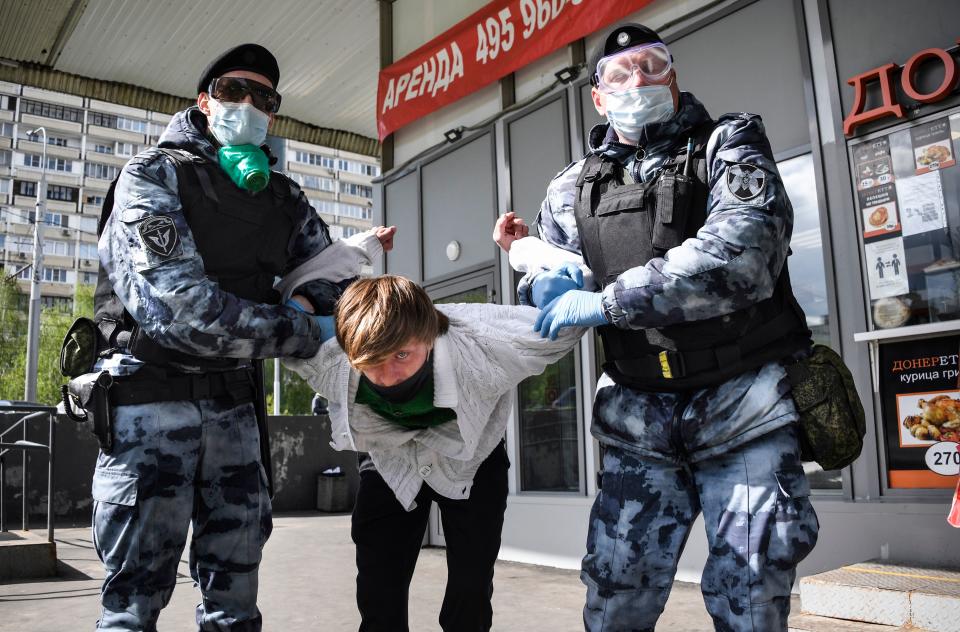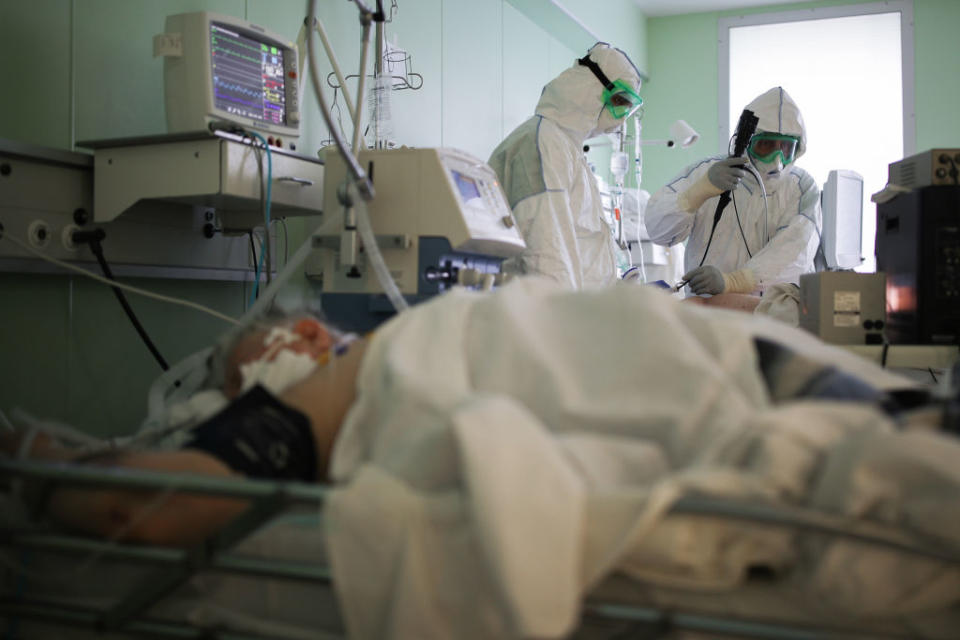Disturbing photo emerges as country's infection rate soars to second highest in world
As Russia struggles to get to grips with its spiralling coronavirus outbreak, authorities appear to be ramping up their response to ensure restriction measures are adhered to.
Alarming images from Moscow on Wednesday (local time) show Russian National Guard servicemen restraining a man not wearing gloves while in public.
In a bid to curtail the rapidly-rising number of infections, the city’s authorities have made it mandatory to wear gloves and a mask on public transport, in shops and other pubic places, or face a fine of 5,000 rubles ($105).
And while the restrained man reportedly refused to take direction from the servicemen deployed on the streets of Moscow to enforce the rules, the images of his arrest paint a sense of desperation in a country that with more than 242,000 cases has rocketed to second in the rankings of worst-hit countries.

The Russian government puts its high number of cases down to its rigorous testing regime, yet with only 2,212 reported coronavirus deaths, Russia also has one of the world's lowest mortality rates.
The disparity between the high number of cases and the relatively low number of deaths has prompted Kremlin critics and various western and Russian media outlets to question the veracity of Russia's official death statistics.
Moscow defends low mortality rate
On Wednesday, Moscow said it had ascribed the deaths of more than 60 per cent of coronavirus patients in April to other causes.
Moscow's Department of Health acknowledged in a statement that the number of deaths in April, 11,846, had been 1,841 higher than the same month last year with almost triple the number of people being registered as having died of the virus.
But it flatly denied it had been dishonestly lowering the Russian capital's coronavirus death toll. Tatyana Golikova, Russia's health minister, has also denied any falsification of the statistics.
Unlike many other countries, Moscow's department of health said it and its federal counterpart conducted post-mortem autopsies in 100 per cent of deaths where coronavirus was suspected as the main cause.
"Therefore, post-mortem diagnoses and causes of death recorded in Moscow are ultimately extremely accurate, and mortality data is completely transparent," it said.
"It's impossible in other COVID-19 cases to name the cause of death. So, for example in over 60 per cent of deaths the cause was clearly for different reasons such as vascular failures (such as heart attacks), stage 4 malignant diseases, leukaemia, systemic diseases which involve organ failure, and other incurable fatal diseases."
Why has Russia been so badly hit?
Like many of the other badly-hit countries, a sense of early optimism in the outbreak paved the way for a disastrous wave of infection.
On March 18, President Vladimir Putin said the "situation, on the whole, is under control" and told his country it was faring far better than other countries.
John Hardie, a research manager at the Foundation for the Defense of Democracies, said Russia took too long to implement any form of lockdown and when it did, residents weren’t obedient.
"Russia waited a long time – until late March – before imposing a partial lockdown, and even those rules weren't always terribly well-followed,” he told Fox News.

Hadie believes Russia’s cases were likely growing well before its recent spike, and believes Russia underreported its cases in the outbreak’s early days.
“During January and February, authorities recorded large spikes in what was reported as pneumonia, but which likely represented unreported COVID-19 cases.”
Vitali Shkliarov from Harvard University's Davis Center for Russian and Eurasian Studies told Fox News the situation in Russia is “dire”.
“In reality, the situation is almost certainly much worse than we know.”
A lack of transparency and control of its media has prompted concern externally over how widespread the virus is.
As they had in China, reports have surfaced of medical workers facing police action for voicing their concerns about overwhelmed hospitals and a lack of PPE.
Last month, three healthcare workers fell from windows after voicing concerns over the state of hospitals and the nation’s approach. Two of the three died and Russian authorities are said to be investigating the incidents.

Putin pushes on to save economy
In a surprise announcement on Monday, Putin said it was time after six weeks to gradually lift nationwide restrictions that had forced many people to work from home and businesses to temporarily close.
Although Putin gave broad leeway to Russia's regions to ease or tighten restrictions as they saw fit, he said it made sense for certain sectors of the bruised economy, such as construction and heavy industry, to be allowed to restart work from Tuesday.
"All the measures we have taken allow us to move to the next step in the fight against the epidemic and start a phased lifting of the lockdown restrictions," Mr Putin said.
His statement, made on the same day that Russia overtook Italy in the number of coronavirus cases reported, drew criticism from some anti-Kremlin politicians.
On Tuesday, the number of Russian coronavirus cases surpassed the reported tally in Britain.
With Reuters
Do you have a story tip? Email: newsroomau@yahoonews.com.
You can also follow us on Facebook, Instagram and Twitter and download the Yahoo News app from the App Store or Google Play.





